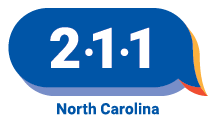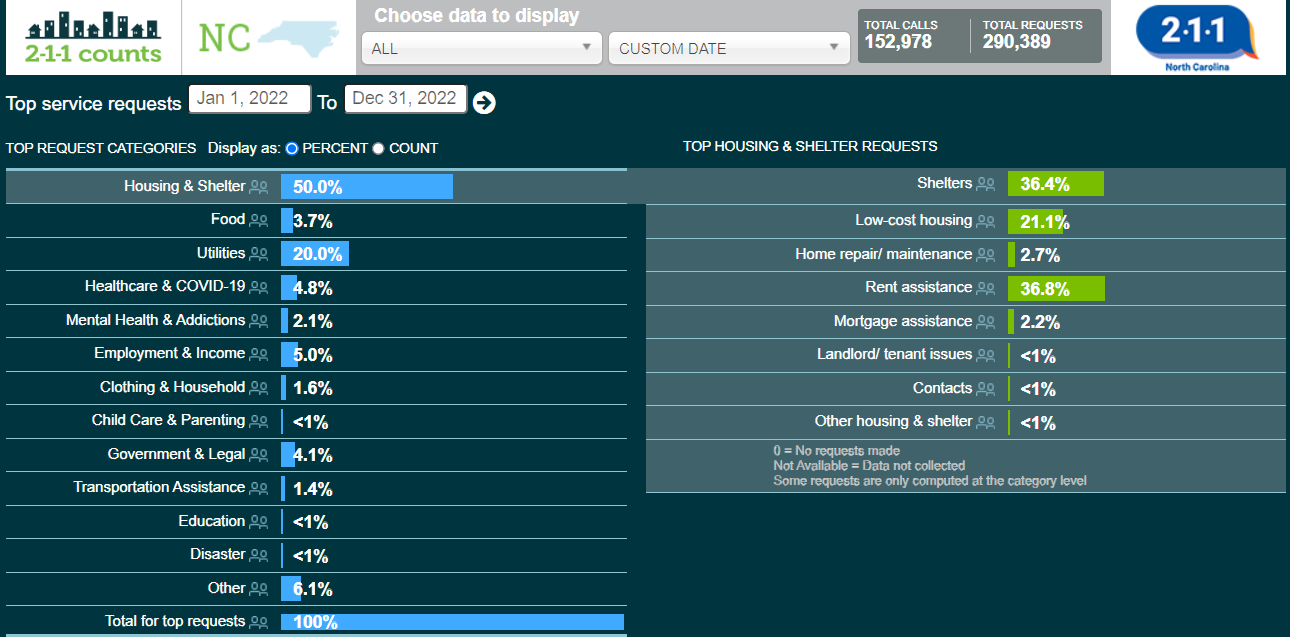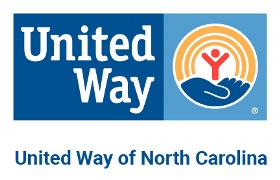211 Counts
More than 150,000 people in North Carolina call 2-1-1 annually for help with basic needs, such as food, shelter, healthcare, disaster services, and more. 211 Counts is the first tool to provide real-time, searchable, and visual presentations of caller data. 211 Counts provides a snapshot of community-specific needs displayed by zip code, region, county, state or federal legislative district as recently as yesterday, allowing you to easily check trends, make comparisons, and share information. View 211 Counts data for North Carolina.
North Carolina Self-Sufficiency Standard
United Way’s Self-Sufficiency Standard tracks the true cost of living facing North Carolina families today, based on household size and geographic location.
As the labor market continues to change, more and more families struggle to stretch their wages to meet the costs of basic necessities. The Standard highlights the growing gap between sluggish wages and ever-increasing expenses, clearly demonstrating the economic “crunch” experienced by so many families today. By tracking and calculating the true cost of living, the Standard allows for comparisons of geographic differences and family make-up as well as documentation of historical trends.
To learn more and read the full 2020 report, CLICK HERE.
Other Reliable Data Sources
General Population StatisticsU.S. Census Bureau Quick Facts – The U.S. Census Bureau provides quick facts about NC’s population, as well as every other state. The tool offers allows you to dig deeper by either entering a county, city, town, or zip code into a search box at the top left, and to view additional demographic, social, economic, and housing characteristics by clicking the magnifying glass at the top right of the data column. View U.S. Census Bureau quick facts for North Carolina.
KIDS COUNT – A project of the Annie E. Casey Foundation, KIDS COUNT is a nationwide initiative that assesses the well-being of children state by state. The KIDS COUNT Data Center provides detailed information about children and families in the following areas: overall well-being, economic well-being, education, health, and family and community. State data can be viewed by state, county, cities, school district, congressional district, or by zip code. View KIDS COUNT data for North Carolina.
NC Child – NC Child produces publications and data reports that document child health and well-being and the impact of public policy decisions on children and families. The organization publishes a yearly North Carolina Child Health Report Card in partnership with the North Carolina Institute of Medicine. The report compiles 40 key indicators on access to healthcare, healthy births, safe homes and neighborhoods, and health risk factors over time and by race and ethnicity. View the North Carolina Health Report Card.
NC Child also produces county data cards to provide local snapshots of child well-being by county using KIDS COUNT data. These cards share data for key indicators in five areas of children’s well-being: A Strong Start, Family Economic Security, Nurturing Homes and Communities, Health and Wellness, and High-Quality Education. Go to County Data Cards.
NC Department of Public Safety – The North Carolina Uniform Crime Reporting (UCR) Program is part of a nationwide, cooperative statistical effort administered by the Federal Bureau of Investigation to generate a reliable set of criminal statistics. View NC Uniform Crime Reports.
U.S. Bureau of Labor Statistics – The Bureau of Labor Statistics provides quick glance information labor force and wage and salary data for the overall state and larger metropolitan areas with the state. More detailed reports are available under the North Carolina Products tab. View Bureau of Labor Quick Glance data for North Carolina.


